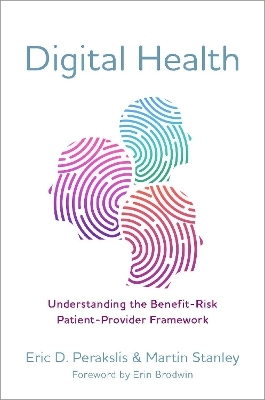
Digital Health
Oxford University Press Inc (Verlag)
978-0-19-750314-0 (ISBN)
Digital health represents the fastest growing sector of healthcare. From internet-connected wearable sensors to diagnostics tests and disease treatments, it is often touted as the revolution set to solve the imperfections in healthcare delivery worldwide. While the health value of digital health technology includes greater convenience, more personalized treatments, and more accurate data capture of fitness and wellness, these devices also carry the concurrent risks of technological crime and abuses pervasive to cyber space. Even today, the medical world has been slow to respond to these emerging risks, despite the growing permanence of digital health technology within daily medical practice.
With over 30 years of joint experience across the medical and cybersecurity industries, Eric D. Perakslis and Martin Stanley provide in this volume the first reference framework for the benefits and risks of digital health technologies in practice. Drawing on expert interviews, original research, and personal storytelling, they explore the theory, science, and mathematics behind the benefits, risks, and values of emerging digital technologies in healthcare.
Moving from an overview of biomedical product regulation and the evolution of digital technologies in healthcare, Perakslis and Stanley propose from their research a set of ten categories of digital side effects, or "toxicities," that must be managed for digital health technology to realize its promise. These ten toxicities consist of adversary-driven threats to privacy such as physical security, cybersecurity, medical misinformation, and charlatanism, and non-adversary-driven threats such as deregulation, cyberchondria, over-diagnosis/over-treatment, user error, and financial toxicity. By arming readers with the knowledge to mitigate digital health harms, Digital Health empowers health practitioners, patients, and technology providers to move beyond fear of the unknown and embrace the full potential of digital health technology, paving the way for more conscientious digital technology use of the future.
Eric Perakslis is Chief Science Officer at the Duke Clinical Research Insititute, Professor in the Department of Population Sciences at Duke School of Medicine, Lecturer in Biomedical Informatics at Harvard Medical School and on the Board of Directors of the Kidney Cancer Association and Vivli. He has previously served as Chief Information Officer and Chief Scientist (Informatics) at the U.S. Food and Drug Administration, Strategic Advisor on Innovation to Médécins Sans Frontières and internationally as Chief Information Officer of the King Hussein Institute for Biotechnology and Cancer in Amman, Jordan. Martin Stanley leads the Strategic Technology Branch at the Cybersecurity and Infrastructure Security Agency (CISA). He has previously led the Cybersecurity Assurance Program at CISA and the Enterprise Cybersecurity Program at the U.S. Food and Drug Administration, and held executive leadership positions at Vonage and UUNET Technologies. Erin Brodwin, health tech reporter and author.
Table of Contents
Preface
Part 1: Historical Overview and the Evolution of Digital Health Technologies
Chapter 1: A Brief History of Biomedical Products Regulation
Chapter 2: Medical Benefit-Risk Determination
Chapter 3: Medical Ethics Models and Frameworks in Digital Health
Chapter 4: The Evolution of Digital Technologies in Healthcare
Chapter 5: Pulse Oximetry in Anesthesia -- The "Perfect" Medical Technology Use Case
Chapter 6: The Technology of Biotechnology and Big Data in Medicines
Chapter 7: Electronic Health Records: Promises, Progress, and Problems
Part 2: The Ten Toxicities of Digital Health
Chapter 8: Introducing the Ten Toxicities
Chapter 9: Adversary-Driven Toxicities
Chapter 10: Non-Adversary-Driven Toxicities
Part 3: Frameworks for Digital Risk and Threat Mitigation
Chapter 11: Modeling Cyber Threats as Medical Adverse Events
Chapter 12: Current State of Cyber Regulation: Understanding Privacy vs. Security
Chapter 13: Cyber Time: The Key Advantage of the Adversary
Chapter 14: Quantifying Cyber Threat for Patients, Providers, and Institutions
Chapter 15: Case Studies: Notable Healthcare Hacks and Lessons Learned
Part 4: Digital Health -- Hope, Hype and Risk Mitigation in Practice
Chapter 16: The "Smart" Clinic
Chapter 17: The Patient as a Mobile Healthcare Consumer
Chapter 18: Artificial Intelligence in Healthcare
Chapter 19: Virtual Health Assistants
Chapter 20: Wearables
Part 5: The Future of Digital Health Benefit-Risk Assessment and Management
Chapter 21: 5 Mitigations for the 10 Toxicities
| Erscheinungsdatum | 06.04.2021 |
|---|---|
| Vorwort | Erin Brodwin |
| Verlagsort | New York |
| Sprache | englisch |
| Maße | 231 x 155 mm |
| Gewicht | 386 g |
| Themenwelt | Informatik ► Netzwerke ► Sicherheit / Firewall |
| Studium ► Querschnittsbereiche ► Prävention / Gesundheitsförderung | |
| Technik ► Umwelttechnik / Biotechnologie | |
| ISBN-10 | 0-19-750314-4 / 0197503144 |
| ISBN-13 | 978-0-19-750314-0 / 9780197503140 |
| Zustand | Neuware |
| Informationen gemäß Produktsicherheitsverordnung (GPSR) | |
| Haben Sie eine Frage zum Produkt? |
aus dem Bereich


